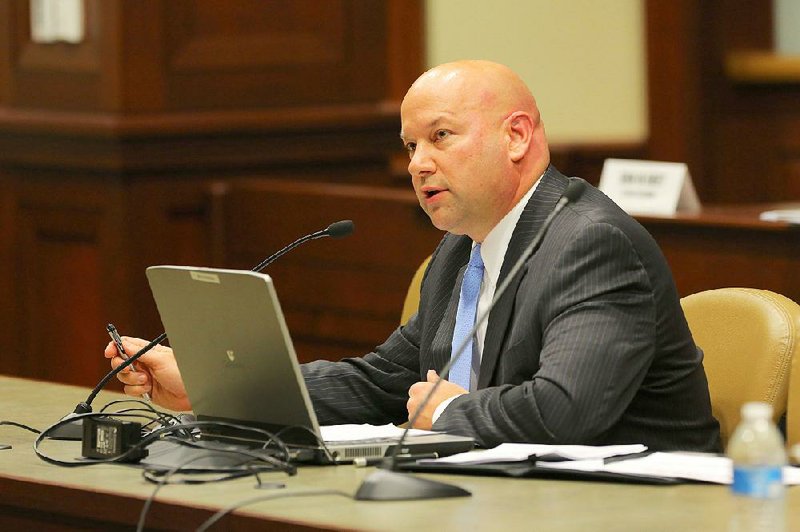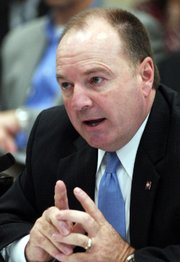The Arkansas lottery has reached an agreement with Georgia-based vendor Scientific Games International to extend its multimillion-dollar contract by 10 years and pay the vendor a lower percentage of the scratch-off sales.
Lottery Director Bishop Woosley asked the Legislature's lottery oversight committee in a letter dated Wednesday to sign off on the proposed contract extension when it meets this afternoon.
But committee member Sen. Bruce Maloch, D-Magnolia, said in an email to the committee's other members that he hadn't received a copy of the proposal until Wednesday morning.
He hopes a decision is delayed "if for no other reason than the timeliness of notice to the members, fairness and transparency to the public and any interested parties."
The lottery, which opened in September 2009, has helped finance more than 30,000 Arkansas Academic Challenge Scholarships during each of the past six fiscal years.
But sales and net proceeds have declined each of the past three fiscal years after peaking in fiscal 2012.
Scientific Games has had the scratch-offs contract since the lottery began. The seven-year contract started Aug. 18, 2009.
If the proposal is approved, the lottery would exercise its option to renew the contract for three one-year periods, and the lottery and Scientific Games would agree to extend it until Aug. 18, 2026.
Scientific Games would cut the percentage of scratch-off sales that the lottery pays the vendor from 1.81 percent to 1.3 percent.
The lottery and Scientific Games also would agree that the vendor would be paid a one-time bonus equal to 4.5 percent of all scratch-off sales exceeding $360 million in a contract year in which sales exceed $360 million.
Woosley said that the estimated annual savings under the proposed extension would depend on scratch-off purchases.
"If sales remain flat for the term of the contract, we could see savings that could be as much as $1.6 million to $1.8 million per year," he said in a written statement. "Savings would continue to increase in proportion to sales until we hit the $360 [million] threshold, then it would begin to decline because of the bonus component of their comp structure.
"If sales were ever to reach $406,015,037 in any particular year, the savings would no longer be realized," Woosley said.
He said the proposed extension is a good deal for the lottery because it's with a known and well-respected vendor.
"They deliver a quality contract and we have a great relationship with them," Woosley said.
"The savings that could be realized over the course of the contract will help to defer the costs of the Camelot [consulting] contract, and the remainder will help to bolster scholarship proceeds," he said.
Woosley said the scratch-off vendor contract shouldn't be rebid because "we have a good working relationship with SGI, part of which is the potential for contract extensions like the one being discussed.
"With those extensions, the lottery will enjoy the benefits of lower costs and the continuity of continued cooperation with a known vendor. Given that, we felt it was in the best interests of the state and the lottery to seek a third extension. It just makes sense at this time."
Hickey said that he needs time to study the proposal. "I just got the whole thing" Wednesday afternoon, he said.
The lottery also is asking the oversight committee today to sign off on its proposed contract with Camelot Global Services to develop a business plan and provide services to help implement the plan.
If approved, the contract would run through at least June 30, 2020.
Camelot Global Services, which has offices in London and Philadelphia, would be paid base compensation of $650,000 in the fiscal year ending June 30 and up to that amount in subsequent years.
Camelot also would be reimbursed for up to $100,000 in mutually agreed upon expenses each year.
And Camelot would get a percentage of any "adjusted operating income" above $72.28 million in any fiscal year. The company would keep 12.5 percent of that income between $72.28 million and $80 million; 13.75 percent of that income between $80 million and $90 million; and 15 percent of any adjusted operating income above $90 million.
The proposed agreement defines "adjusted operating income" as operating income before charging any expenses relating to services provided by the state Department of Higher Education, Arkansas Legislative Audit (formerly the Legislative Audit Division), legal and professional services and depreciation. Adjusted operating income measures the performance of the lottery without consideration of expenses that are deemed beyond the lottery's control, said Jake Bleed, a spokesman for the state Department of Finance and Administration.
The proposal also would allow for two additional one-year extension beyond the June 30, 2020, expiration date.
The proposed contract says Camelot will help the lottery renegotiate contracts with vendors and the savings will be used to help pay for Camelot's services.
Committee member Sen. Bart Hester, R-Cave Springs, said he doesn't know whether paying Camelot several hundred thousand dollars a year "is the end of the world," but the proposed contract deserves to be discussed by the committee members.
Meanwhile, Maloch expressed concern that details of the proposed contract extension with Scientific Games had been withheld until the last minute, adding that the lottery oversight committee's agenda hadn't been posted until sometime Wednesday morning.
"Quite frankly, I do not know whether it is in the best interest of the state to do this or not," he wrote in his email obtained under the Arkansas Freedom of Information Act.
"It may be fine, but it is not acceptable to send this notice of a contract extension involving millions of dollars to committee members barely 24 hours before it will be considered by the committee," Maloch said. "We should have had notice and discussion of the reasoning behind this request significantly in advance of the meeting with opportunity to do our own due diligence to properly consider the matter."
He said he would be unable to attend this afternoon's meeting because he has "a conflict" with the meeting time.
Woosley, who has been the lottery's director since February 2012, said that "we understand the senator's frustration and did everything we could to get the information before the committee as quickly as possible.
"However, the nature of these negotiations included some last minute items that required our attention. We sincerely regret the delay it caused," Woosley said.
Metro on 10/15/2015

